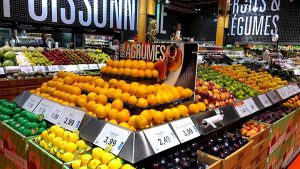The grocery market is incredibly competitive, with profits typically working out to less than 5 percent of revenue. With margins so thin, many expect companies like Loblaw to look for ways to spend less on labor and more on providing the products and services consumers want now.

Among these desires are online shopping, delivery and/or pickup, better-for-you foods, and an array of eco-friendly items.
Loblaw could also take a leadership role in the Canadian organics market, which is expected to reach $5 billion in value by 2020, according to MarketLine. Will growing consumer interest in these not-always compatible segments offset thin margins and cost pressures?
The answer may lie in a speech executive chairman Galen Weston’s gave at the University of Guelph’s Arrell Food Summit last year, where he announced the grocer would launch 30 exclusively vegan products this year.
Weston also addressed the rise of organics, “artisanal and authentic experiences,” gluten free and lactose free, paleo, keto, and other immersive diets. The retailer is also committed to spending more on locally sourced foods by 2025.
Considering Canada’s short growing season, greenhouses, as well as vertical farms, will play a role in this strategy. The company currently works with about 300 domestic growers, sourcing more produce domestically than any other grocer, and has recently launched a vertical farm pilot program in Newfoundland.
Along with expanding its local foods, Loblaw is ramping up ecommerce options including its own meal-kit delivery service tied to data from consumer shopping patterns. Ingredients and meals could be recommended based on previous purchases, size of the household, and dietary preferences.
The company is also moving forward with two significant environmental initiatives: first, to cut food waste (reportedly at 6 to 7 percent) in half by 2025; and second, to reduce its sizeable trucking fleet’s carbon emissions by 30 percent by 2030, which will be helped along by a recent purchase of electric trucks from Tesla.
Lastly, Loblaw also has an eye on the future through Canada’s youngest consumers. The company’s charitable arm, President’s Choice Children’s Charity, recently donated a modular vertical farm to a high school in La Loche, Saskatoon.
Amazingly, the modular farm can produce up to 100 bowls of salad per day for local school children with limited access to fresh produce.
One of the charity’s grant recipients, a teacher named Dakota Decaux, remarked, “Kids are aching to learn about how to grow things and how to produce their own food. I think it’s a skill that has kind of been lost in this particular generation, and they’re really eager to learn how to do it and get connected to nature.”
This is an excerpt from the most recent Produce Blueprints quarterly journal. Click here to read the full supplement.


